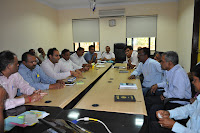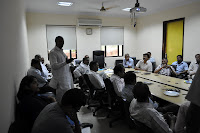The SaciWATERS stakeholder meeting held in Gurgaon on the 13th of December 2012, began with Dr Narain, setting the agenda for the meeting. He expressed, that the role of SaciWATERS is that of a dialogue facilitator and that it wanted to promote mutual accountability amongst the main stakeholders. They being the community and the PHED. Further Aman Dewan, with prior consultation from the community, set out the main points that had to be discussed. Two main issues were cropped up; the first being that the Dharamsala line of the village is not able to get access to PHED water supply. The second issue was that a Tube-well is needed beyond the railway line so that people not serviced by the PHED can also access a safe water source.
In Sultanpur a settlement of Balmiks
live beyond the railway line, the PHED does not have permission to supply water
beyond that point, as it comes under the jurisdiction of the railways. The
Balmiks being lower caste people are often refused water by the upper castes,
as they feel that their presence pollutes their water sources. Due to this lack
of social cohesion, amongst the different castes of the village, the Balmiks
suffer the most. Starting with the first issue, the people said that,
they want a larger capacity motor to increase pressure of the water supply. The
PHED responded, that the mess was due to illegal water connections, and that if
people installed taps then, he would ensure that sufficient water will be
provided.
Understanding the concern of the
community, the PHED team said that it shall try to increase the allocation of
time; water is supplied, from 20 to 30 minutes. The issues were concluded by
agreement that the Panchyat will cut illegal connections and get the village
water connections registered, further to which if water availability is not
sufficient; the PHED shall install a larger motor. The second issue was a
relatively more harmonious issue. The PHED was in agreement that a tube-well
must be present, and that a resolution should be given proclaiming that area as
a Dhaani, as they are getting government patronage. It was agreed that within a
week, the Panchayat will present the resolution to the PHED, which would then
process it.
Dr Narain showed concern towards the
timeline of this activity, to which the PHED replied, that they shall be
informed about funds availability during a meeting in April, and thus this
issue will be fixed post that. The meeting concluded on a positive note, with
the community agreeing to try out legal water connections and the PHED also
assuring the people, that if even that did not work out, they shall be
ready with their next set of solutions. Personally it was great to see the
stakeholders interact, such dialogue does not leave room for doubt, thus
furthering the trust levels between stakeholders.
Thus the stakeholders meeting was a
great opportunity for SaciWATERS to fulfill its agenda as a catalyst for
change.













